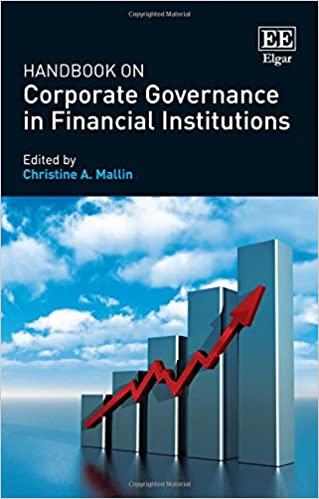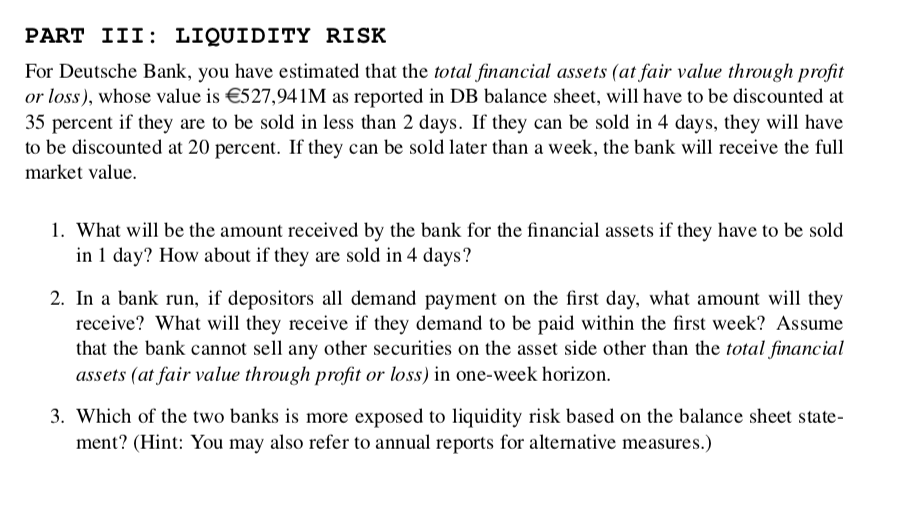
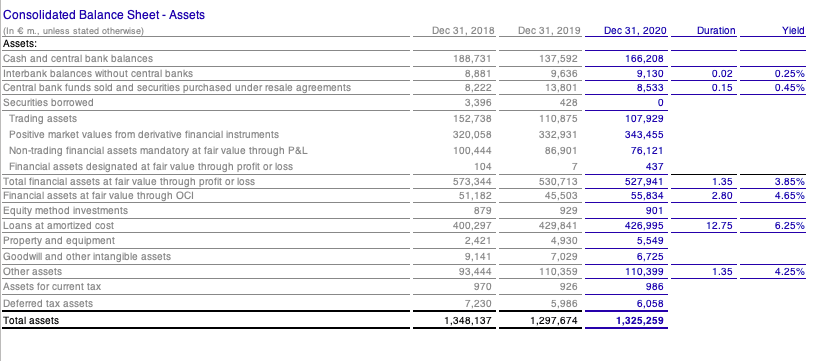
Second Bank:
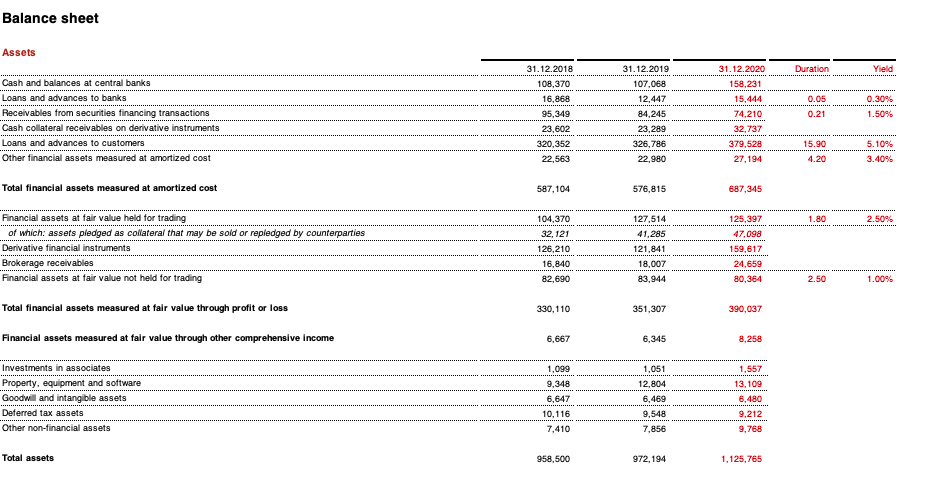
Q3 GUIDELINE
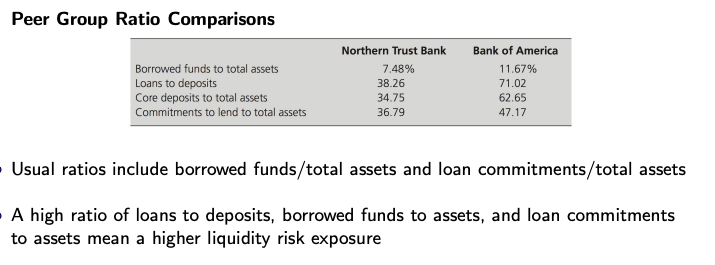
PART III: LIQUIDITY RISK For Deutsche Bank, you have estimated that the total financial assets (at fair value through profit or loss), whose value is 527,941M as reported in DB balance sheet, will have to be discounted at 35 percent if they are to be sold in less than 2 days. If they can be sold in 4 days, they will have to be discounted at 20 percent. If they can be sold later than a week, the bank will receive the full market value. 1. What will be the amount received by the bank for the financial assets if they have to be sold in 1 day? How about if they are sold in 4 days? 2. In a bank run, if depositors all demand payment on the first day, what amount will they receive? What will they receive if they demand to be paid within the first week? Assume that the bank cannot sell any other securities on the asset side other than the total financial assets (at fair value through profit or loss) in one-week horizon. 3. Which of the two banks is more exposed to liquidity risk based on the balance sheet state- ment? (Hint: You may also refer to annual reports for alternative measures.) Dec 31, 2018 Dec 31, 2019 Dec 31, 2020 Duration Yield 166,208 9,130 8,533 0 0.02 0.15 0.25% 0.45% Consolidated Balance Sheet - Assets (In 6 m., unless stated otherwise) Assets: Cash and central bank balances Interbank balances without central banks Central bank funds sold and securities purchased under resale agreements Securities borrowed Trading assets Positive market values from derivative financial instruments Non-trading financial assets mandatory at fair value through P&L Financial assets designated at fair value through profit or loss Total financial assets at fair value through profit or loss Financial assets at fair value through OCI Equity method investments Loans at amortized cost Property and equipment Goodwill and other intangible assets Other assets Assets for current tax Deferred tax assets Total assets 188,731 8,881 8,222 3,396 152,738 320,058 100,444 104 573,344 51,182 879 400,297 2,421 9,141 93,444 970 7,230 1,348,137 137,592 9,636 13,801 428 110.875 332,931 86,901 7 530,713 45,503 929 429,841 4,930 7,029 110,359 926 5,986 1,297,674 1.35 2.80 3.85% 4.65% 107,929 343,455 76,121 437 527,941 55,834 901 426,995 5,549 6,725 110,399 986 6,058 1,325,259 12.75 6.25% 1.35 4.25% Balance sheet Assets Duration Yield 31.12.2018 108,370 16,868 95,349 23,602 320,352 22,563 31.12.2019 107,068 12,447 84,245 23,289 326,786 22,980 Cash and balances at central banks Loans and advances to banks Receivables from securities financing transactions Cash collateral receivables on derivative instruments Loans and advances to customers Other financial assets measured at amortized cost 31.12.2020 158,231 15,444 74,210 32,737 379,528 0.05 0.21 0.30% 1.50% . 15.90 4.20 5.10% 3.40% 27,194 Total financial assets measured at amortized cost 587,104 576,815 687,345 1.80 2.50% Financial assets at fair value held for trading of which: assets pledged as collateral that may be sold or repledged by counterparties Derivative financial instruments Brokerage receivables Financial assets at fair value not held for trading 104,370 32, 121 126,210 16,840 82,690 127,514 41.285 121,841 18,007 83,944 125,397 47,098 159,617 24,659 80,364 2.50 1.00% Total financial assets measured at fair value through profit or loss 330,110 351,307 390,037 Financial assets measured at fair value through other comprehensive Income 6,667 6,345 8.258 Investments in associates Property, equipment and software Goodwill and intangible assets Deferred tax assets Other non-financial assets 1,099 9,348 6,647 10.116 7.410 1.051 12,804 6,469 9,548 7,856 1,557 13,109 6,480 9,212 9,768 ********** Total assets 958,500 972,194 1,125,765 Peer Group Ratio Comparisons Borrowed funds to total assets Loans to deposits Core deposits to total assets Commitments to lend to total assets Northern Trust Bank 7.48% 38.26 34.75 36.79 Bank of America 11.67% 71.02 62.65 47.17 Usual ratios include borrowed funds/total assets and loan commitments/total assets A high ratio of loans to deposits, borrowed funds to assets, and loan commitments to assets mean a higher liquidity risk exposure PART III: LIQUIDITY RISK For Deutsche Bank, you have estimated that the total financial assets (at fair value through profit or loss), whose value is 527,941M as reported in DB balance sheet, will have to be discounted at 35 percent if they are to be sold in less than 2 days. If they can be sold in 4 days, they will have to be discounted at 20 percent. If they can be sold later than a week, the bank will receive the full market value. 1. What will be the amount received by the bank for the financial assets if they have to be sold in 1 day? How about if they are sold in 4 days? 2. In a bank run, if depositors all demand payment on the first day, what amount will they receive? What will they receive if they demand to be paid within the first week? Assume that the bank cannot sell any other securities on the asset side other than the total financial assets (at fair value through profit or loss) in one-week horizon. 3. Which of the two banks is more exposed to liquidity risk based on the balance sheet state- ment? (Hint: You may also refer to annual reports for alternative measures.) Dec 31, 2018 Dec 31, 2019 Dec 31, 2020 Duration Yield 166,208 9,130 8,533 0 0.02 0.15 0.25% 0.45% Consolidated Balance Sheet - Assets (In 6 m., unless stated otherwise) Assets: Cash and central bank balances Interbank balances without central banks Central bank funds sold and securities purchased under resale agreements Securities borrowed Trading assets Positive market values from derivative financial instruments Non-trading financial assets mandatory at fair value through P&L Financial assets designated at fair value through profit or loss Total financial assets at fair value through profit or loss Financial assets at fair value through OCI Equity method investments Loans at amortized cost Property and equipment Goodwill and other intangible assets Other assets Assets for current tax Deferred tax assets Total assets 188,731 8,881 8,222 3,396 152,738 320,058 100,444 104 573,344 51,182 879 400,297 2,421 9,141 93,444 970 7,230 1,348,137 137,592 9,636 13,801 428 110.875 332,931 86,901 7 530,713 45,503 929 429,841 4,930 7,029 110,359 926 5,986 1,297,674 1.35 2.80 3.85% 4.65% 107,929 343,455 76,121 437 527,941 55,834 901 426,995 5,549 6,725 110,399 986 6,058 1,325,259 12.75 6.25% 1.35 4.25% Balance sheet Assets Duration Yield 31.12.2018 108,370 16,868 95,349 23,602 320,352 22,563 31.12.2019 107,068 12,447 84,245 23,289 326,786 22,980 Cash and balances at central banks Loans and advances to banks Receivables from securities financing transactions Cash collateral receivables on derivative instruments Loans and advances to customers Other financial assets measured at amortized cost 31.12.2020 158,231 15,444 74,210 32,737 379,528 0.05 0.21 0.30% 1.50% . 15.90 4.20 5.10% 3.40% 27,194 Total financial assets measured at amortized cost 587,104 576,815 687,345 1.80 2.50% Financial assets at fair value held for trading of which: assets pledged as collateral that may be sold or repledged by counterparties Derivative financial instruments Brokerage receivables Financial assets at fair value not held for trading 104,370 32, 121 126,210 16,840 82,690 127,514 41.285 121,841 18,007 83,944 125,397 47,098 159,617 24,659 80,364 2.50 1.00% Total financial assets measured at fair value through profit or loss 330,110 351,307 390,037 Financial assets measured at fair value through other comprehensive Income 6,667 6,345 8.258 Investments in associates Property, equipment and software Goodwill and intangible assets Deferred tax assets Other non-financial assets 1,099 9,348 6,647 10.116 7.410 1.051 12,804 6,469 9,548 7,856 1,557 13,109 6,480 9,212 9,768 ********** Total assets 958,500 972,194 1,125,765 Peer Group Ratio Comparisons Borrowed funds to total assets Loans to deposits Core deposits to total assets Commitments to lend to total assets Northern Trust Bank 7.48% 38.26 34.75 36.79 Bank of America 11.67% 71.02 62.65 47.17 Usual ratios include borrowed funds/total assets and loan commitments/total assets A high ratio of loans to deposits, borrowed funds to assets, and loan commitments to assets mean a higher liquidity risk exposure










